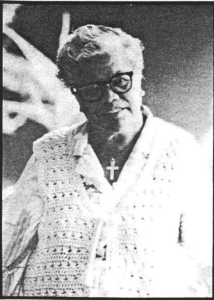Katherine "Nina" Kalaiwaa

A Social History of Kona
This project, a case study of Hawaii's social history, focuses on Kona where people nurtured the development of a community and participated in and witnessed some.of the major historical developments of the islands.
Katherine "Nina" Kalaiwa'a was born on July 28, 1910, in Ke'ei, South Kana, Hawaii to parents Victor Kukua Kalua and Veronica Keawe. She attended Napoopoo School and held a variety of jobs throughout her life, including housekeeper, babysitter, plantation worker, castor bean picker, coffee farmer, and lau hala weaver. Between 1932 and 1948, while living in Honolulu, she worked as a waitress and a pineapple cannery worker. Later in life, she became a resident of Honokohau, North Kana, and was active in various Hawaiian clubs and senior citizens' groups.
Scope and Content Note
This collection contains an oral history interview with Katherine "Nina" Kalaiwa'a conducted by Larry L. Kimura and Ray Kala Enos on January 15, 1981, at her home in Honokohau, North Kana, Hawaii. The interview covers a range of topics, including her style of living in Kona, her family's history, and her work experiences. Nina discusses the three different areas where her family lived in Kona, including Ke'ei, middle, and up Ke'ei. She also talks about the land ownership and the traditional Hawaiian way of living, which involved having different areas for different activities, such as farming, coffee cultivation, and fishing. She recalls the old-time Hawaiian families living in her area of Ke'ei, Kana, including the Kala family, Kanuhas, Kumuko'a, Joe Pa'akaua, Kaua Panui, Harry Pelio, Lono, Naihe Kukui, the Machado family, David Baker, and Apoleki. Nina also shares her personal work experiences, including her time working in Honolulu at a post exchange (PX). The interview provides a rich account of Nina's life, her family's history, and the socio-cultural context of Hawaii during her lifetime.
Program Note:
This interview is part of the Center for Oral History's project A Social History of Kona. Interviews from this project are available in the Center's ScholarSpace open access repository.
The Center for Oral History (COH), in the Department of Ethnic Studies at the University of Hawaiʻi at Mānoa, collects, documents, preserves and highlights the recollections of Native Hawaiians and the multi-ethnic people of Hawaiʻi. It produces oral histories and interpretive historical materials about lifeways, key historic events, social movements and Hawaiʻi’s role in the globalizing world, for the widest possible use.
Please Note: The oral histories in this collection are protected by copyright and have been created for educational, research and personal use as described by the Fair Use Doctrine in the U.S. Copyright law. Please reach out Voices@noaa.gov to let us know how these interviews are being used in your research, project, exhibit, etc. The Voices staff can help provide other useful resources related to your inquiry.
The NOAA mission is to understand and predict changes in climate, weather, oceans, and coasts, to share that knowledge and information with others, and to conserve and manage coastal and marine ecosystems and resources. The Voices Oral History Archives offers public access to a wide range of accounts, including historical materials that are products of their particular times, and may contain offensive language or negative stereotypes.
Voices Oral History Archives does not verify the accuracy of materials submitted to us. The opinions expressed in the interviews are those of the interviewee only. The interviews here have been made available to the public only after the interviewer has confirmed that they have obtained consent.
